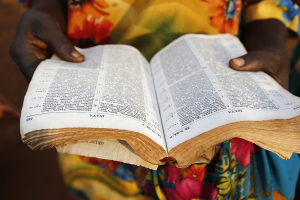From Mainline to Sideline - The Death of Protestant America
Joseph Bottum remembers a time when America was painted in bold Protestant hues. "America was Methodist, once upon a time - Methodist, or Baptist, or Presbyterian, or Congregationalist, or Episcopalian," he explains. But, that was then, and this is now.
Now, Bottum suggests that the average American "would have trouble recalling the dogmas that once defined all the jarring sects, but their names remain at least half alive."
Bottum writes of this Protestant collapse in the August/September 2008 issue of "First Things," one of the most influential intellectual journals of the day. In "The Death of Protestant America: A Political Theory of the Protestant Mainline," Bottum offers a clever and insightful theory of mainline decline - the collapse of liberal Protestantism as a movement and dominant cultural influence.
That dominance was once unquestioned. As Bottum explains:
And yet, even while we may remember the names of the old denominations, we tend to forget that it all made a kind of sense, back in the day, and it came with a kind of order. The genteel Episcopalians, high on the hill, and the all-over Baptists, down by the river. Oh, and the innumerable independent Bible churches, tangled out across the prairie like brambles: Through most of the nation's history, these endless divisions and revisions of Protestantism renounced one another and sermonized against one another. They squabbled, sneered, and fought. But they had something in common, for all that. Together they formed a vague but vast unity. Together they formed America.
Bottum then offers his political theory of the Protestant mainline. America, he asserts, was really a Protestant nation from the start. This Protestant identity, he argues further, was an "obvious fact." Jews and Catholics were tolerated, but the central identity of the culture was Protestant.
The American concept of religious liberty was, he argues, actually about making space for intra-Protestant rivalries and was "essentially a Protestant idea." The dominance of mainline Protestantism within the culture represented one leg of a "three-legged stool" that joined democracy and capitalism to establish civic order and national self-consciousness. Protestantism provided the nation's narrative, he offers, along with a moral vocabulary.
Nevertheless, the mainline Protestant denominations began to implode in the 1960s. In Bottum's analysis, this decline meant that the main stream of Protestantism began to run dry in the 1970s. Further:
In truth, there are still plenty of Methodists around. Baptists and Presbyterians, too—Lutherans, Episcopalians, and all the rest; millions of believing Christians who remain serious and devout. For that matter, you can still find, soldiering on, some of the institutions they established in their Mainline glory days: the National Council of Churches, for instance, in its God Box up on New York City's Riverside Drive, with the cornerstone laid, in a grand ceremony, by President Eisenhower in 1958. But those institutions are corpses, even if they don't quite realize that they're dead. The great confluence of Protestantism has dwindled to a trickle over the past thirty years, and the Great Church of America has come to an end.
And that leaves us in an odd situation, unlike any before. The death of the Mainline is the central historical fact of our time: the event that distinguishes the past several decades from every other period in American history. Almost every one of our current political and cultural oddities, our contradictions and obscurities, derives from this fact: The Mainline has lost the capacity to set, or even significantly influence, the national vocabulary or the national self-understanding.
Bottum then offers a statistical analysis wedded to his historical review. The collapse of the Protestant mainline has been swift, steady, and self-inflicted. These denominations embraced theological liberalism and adopted accommodationism as a cultural posture. Bottum estimates that less than 8 percent of Americans are now members of "the central churches of the Protestant Mainline."
Accordingly:
Episcopalian, Methodist, Presbyterian, Lutheran—the name hardly matters anymore. It's true that if you dig through the conservative manifestos and broadsides of the past thirty years, you find one distressed cry after another, each bemoaning the particular path by which this or that denomination lost its intellectual and doctrinal distinctiveness.
In the course of his article, Bottum offers a sophisticated and compelling sociological and theological understanding of what happened to the churches of the Protestant Mainline as they lost their members and forfeited their influence. He offers a lament that the American experiment is now robbed of a central support.
"We all have to worry about it, now," Bottum reflects. "Without the political theory that depended on the existence of the Protestant Mainline, what does it mean to support the nation? What does it mean to criticize it? The American experiment has always needed what Alexis de Tocqueville called the undivided current, and now that current has finally run dry."
What can replace it? Bottum suggests that neither Catholicism (with its "vast intellectual resources") nor Evangelicalism (unable to offer "a widely accepted moral rhetoric") can replace what America's Protestant identity once provided.
His argument is convincing and his analysis is well documented. Furthermore, his concern for the nation's social cohesiveness is admirable. Joseph Bottum is clearly on the right track with his "political theory of the Protestant Mainline."
Nevertheless, understanding a "theological theory" of liberal Protestantism's collapse is an even greater concern. The health of the church is a far greater concern than the health of the nation. The primary injury caused by mainline Protestant decline is not social but spiritual. These denominations once fueled the great missionary movement that carried the Gospel to the ends of the earth. Now, liberal Protestantism sees conversionist missions as an embarrassment. Committed to a radical doctrinal relativism, these denominations have served as poster children for virtually every theological fad and liberal proposal imaginable. Now, many of these denominations are involved in court fights to keep churches from leaving. The stream has indeed run dry.
The "Death of Protestant America" Joseph Bottum describes must serve as a warning to Evangelicals. There can be no doubt where theological revisionism and accommodationism will lead. Why, then, would some argue that Evangelicalism should follow essentially the same path? Can they not see that the liberal Protestant river has run dry?





























